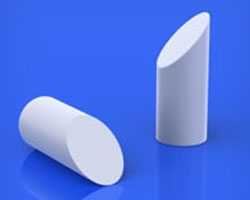Latest news from Loughborough University
16 Jun 2015
Research collaboration seeks to improve flowmeters
 Image: Morgan Advanced Materials
Image: Morgan Advanced Materials
Loughborough University is working with materials engineering company Morgan Advanced Materials in a project which seeks to increase the accuracy and reliability of ultrasonic flow meters.
The collaboration will specifically see Loughborough’s Advanced Ceramics Research Group and Morgan explore the potential use of alumina blocks in place of stainless steel ones which are currently widely used in flow meters.
High performance ultrasonic flow meters have many uses, but are particularly used in smart meters for utility and industrial flow measurement. Ultrasonic meters provide greater sensitivity, accuracy and longevity compared to the more traditional mechanical flow meter.
The roll-out of smart meters worldwide has seen an increase in demand for accurate, reliable and durable ultrasonic flow meters.
As part of their research, the two organisations will evaluate the degradation of stainless steel and alumina ceramics through a test that stimulates 20 years of service within a flow tube. It is very important that the blocks must retain their reflective surface throughout service, since any loss or degradation of reflection will impair the transmission of the ultrasonic signal between sensors.
Professor Bala Vaidhyanathan, from the Department of Materials is leading Loughborough’s Advanced Ceramics Research Group. He commented: “We’re delighted to be working with Morgan Advanced Materials on this high impact research project. Together, we can investigate the effect of using alumina blocks for flow measurements and potentially increase the accuracy, longevity and reliability of ultrasonic flow meters by changing the components involved.”
Dr Yifei Zhang of Morgan Advanced Materials said: “The accurate measurement of volume flow is important in many sectors, but at the moment there is particular interest in smart meters. This growing commercial application fuels demand for highly accurate meters that are cost-effective and durable which require novel materials to be applied in innovative new ways. We are proud to be working with Loughborough University on the type of research that will take technical ceramics – and ultrasonic flow meters – into the future.”
Notes for editors
Article reference number: June News
Loughborough is one of the country’s leading universities, with an international reputation for research that matters, excellence in teaching, strong links with industry, and unrivalled achievement in sport and its underpinning academic disciplines.
It has been awarded five stars in the independent QS Stars university rating scheme, putting it among the best universities in the world, and was named University of the Year in the What Uni Student Choice Awards 2015.Loughborough is consistently ranked in the top twenty of UK universities in the Times Higher Education’s ‘table of tables’ and is in the top 10 in England for research intensity. It was 2nd in the 2015 THE Student Experience Survey and was named Sports University of the Year 2013-14 by The Times and Sunday Times. In recognition of its contribution to the sector, Loughborough has been awarded seven Queen's Anniversary Prizes.
In 2015 the University will open an additional academic campus in London’s new innovation quarter. Loughborough University London, based on the Queen Elizabeth Olympic Park, will offer postgraduate and executive-level education, as well as research and enterprise opportunities.
Morgan’s Technical Ceramics business is a market leader in the manufacture of ultrasonic flow sensors, using a special grade of piezoelectric ceramic, lead zirconate titanate (PZT). This cutting-edge material, combined with Morgan's top class manufacturing and assembly capabilities, produces ultrasonic sensors of exceptional quality. Now, Morgan is putting itself firmly at the forefront of relevant research, in collaboration with the Advanced Ceramics Research Group at Loughborough University.